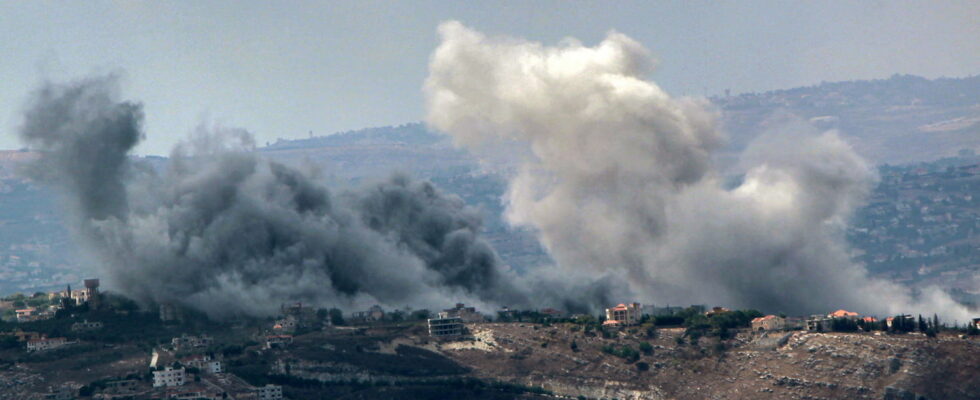As Israel has been leading an offensive against southern and eastern Lebanon for several days, the military escalation between the two countries has raised fears of a generalized war among the international community.
“We are almost on the brink of total war.” The military escalation observed between Israel and the Lebanese Hezbollah has led the head of European diplomacy, Josep Borrell, to fear the worst, who spoke about the conflict and the risk of its extension on the sidelines of the UN General Assembly in New York on Monday, September 23. A statement made in response to the hail of Israeli strikes that hit Lebanon and left 492 dead, including 35 children, on Monday – the deadliest for Lebanon in a year.
Israel, which began its “Northern Arrows” operation targeting southern and eastern Lebanon on Friday, September 20, plans to continue the offensive. The Israeli army, Tsahal, says it is preparing for new phases of the operation and announces “large-scale” strikes in the Bekaa Valley, a Hezbollah military stronghold located in eastern Lebanon. A targeted strike on Beirut, the Lebanese capital, has also been announced. Tsahal claims strikes that hit “more than 1,600 targets” of Hezbollah during the day on Monday. Justifying his deadly offensive, Israeli Prime Minister Benjamin Netanyahu said he was in the process of reversing the “balance of power” to allow the return to northern Israel of tens of thousands of displaced Israeli residents.
Lebanon’s Hezbollah, hit by airstrikes and targeted by explosions of pagers and walkie-talkies last week, claimed to have responded with dozens of rocket attacks targeting, it said, the “main warehouses” of the IDF in northern Israel. After the various air assaults, a possible ground invasion of Israeli forces in Lebanon is feared.
Israel accused of wanting to “expand” the conflict in the Middle East
While the exchange of fire between Israel and Lebanon has been going on since the Hamas attack on October 7, the escalation of the last few days has raised fears of a generalization of the conflict in the Middle East. On the Iranian side, which is close to the Lebanese Hezbollah and the Gazan Hamas, President Massoud Pezeshkian accused the Hebrew state of wanting to “expand” the conflict to the Middle East region. He added that extending the confrontations would “benefit no one” and that Tehran’s objective is not to “destabilize” the region.
Iran and its proxies in Lebanon, Hezbollah, believe that Israel is aiming to trigger a general war, according to the analysis of Ghassan Salamé, former Lebanese Minister of Culture and former UN special envoy for Libya, made in The Great Continent. The political scientist adds that a total war would not suit Iran and its supporters because of a balance of power favorable to the Hebrew state. Faced with Hezbollah, “it is clear that the Israeli air force has obvious supremacy”. As for Iran, Ghassan Salamé explains that a “general war where the Israeli air force could demonstrate its supremacy endangers the system” of regional relays set up with Hezbollah, the Hachd, the Houthis, Hamas and Islamic Jihad. The fact remains that Iran has nuclear weapons… like Israel’s American ally.
Israel, historically supported by the United States, can indeed count on the American military arsenal. A nuclear strike against the Hebrew state could therefore lead to a similar response from American forces, but the scenario is not yet on the table, neither on one side nor the other. The United States, while supporting the Hebrew state, has also called for a certain restraint in military escalation, it has opposed a ground invasion of Israel in Lebanon and must present “concrete ideas” to reduce military tensions on the Israeli-Lebanese border according to the statements of an American official on September 23.
While neither Hezbollah nor Iran want a generalized war, according to Ghassan Salamé, they are still organizing strikes and retaliations against Israel to present deterrent forces. “The challenge is to calibrate these reprisals in such a way as to avoid falling into what they consider to be a trap set for them, namely that of an escalation towards a generalized war,” specifies the political scientist and former UN special envoy.
UN takes threat of ‘total war’ seriously
Faced with the military escalation between Israel and Lebanon, the UN Secretary General, Antonio Guterres, said he was “very seriously concerned” according to the statements of his spokesperson on Monday, September 23. A concern shared by Egypt, including the Ministry of Foreign Affairs, which, on the same day, called on “international powers and the UN Security Council to intervene immediately” to put an end to “the dangerous Israeli escalation in Lebanon.”
The UN member countries have themselves taken up the issue and France has requested the organisation of an “emergency meeting of the UN Security Council” “this week”, as Foreign Minister Jean-Noël Barrot announced at the UN summit: “France calls for de-escalation and to avoid a regional conflagration that would be devastating for everyone, starting with the civilian populations”.
In the Middle East, Iraq has indicated that it wants to organize an “urgent meeting” of delegations from Arab countries currently present in New York for the United Nations General Assembly.
